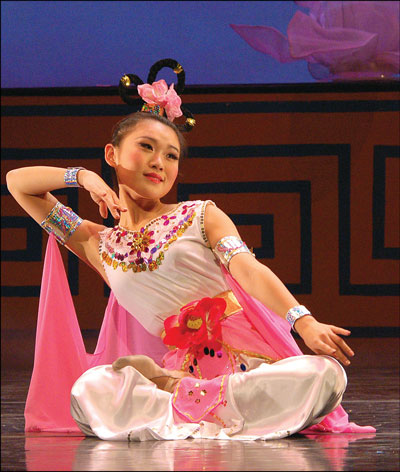
TANG SHEBANG: A Divine Performing Arts dancer
(Clearwisdom.net) "The Year of the Rat symbolizes new beginnings and change," says Francis Madore, spokesperson for, no, not Barack Obama, but for "not-for-profit, independent, Chinese-language television" company New Tang Dynasty TV, which is presenting the Chinese New Year Spectacular at Place des Arts this week (though the actual Chinese New Year falls on February 7 this year).
"The legend says that at the time of the new year, the Buddha called upon all the animals to meet him, so he could assign them roles. Only 12 showed up, and each was given a year, so people born in that year would get the characteristics of that animal. People born under the year of the rat tend to be leaders, pioneers, conquerors. They're usually charming, passionate, charismatic, practical, and, of course, hardworking, like you know the rat is."
The charm quotient of rats could be debated, but the dedication of the Divine Performing Arts Troupe, composed largely of Chinese émigrés and ex-pats, is unquestionable. Among the most successful touring shows in the world, the Spectacular strives to revive five millennia of Chinese art and history without fudging the specifics.
"The movements of the dancers, the costumes they wear, the backdrops--every detail is weighed and studied so that they're as authentic as possible," says Madore.
"The Chinese people themselves have been disconnected from this ancient culture, which was governed by dynasties. Each dynasty had a specific culture, depending on the emperor. These are people who had high beliefs in gods and adhered to high standards of morality, and they believe that's what enabled them to develop these rich, glorious civilizations of ancient China. Now, with the Cultural Revolution and even in historical textbooks, all this information has been altered or removed. So it's really interesting for both Chinese and Western audiences."
The show touches on the Tang, Qing and Song dynasties, says Madore, "and on top of that, it goes into depicting some ethnic groups that prevailed in China. For example, there's the traditional Mongolian cup dance, where the ladies carry cups with actual milk in them on their heads. The Manchurian ethnicity is also depicted, and the Tibetans."
Madore adds a final but not inconsequential note, an unsurprising one given
the Falun Dafa Association's collaboration on the show. "The 5,000 years of
Chinese history that are covered are from the ancient times, but also modern
times. Some scenes depict the human-rights issues in China in the last 50 years,
so there's something to learn there, too."
At Place des Arts Tuesday to Thursday, Jan. 15-17,
7:30 p.m. (also 2:30 p.m. on Feb. 16), $38-$158, all ages
http://www.montrealmirror.com/2008/011008/music3.html
Category: Parades & Other Community Events








